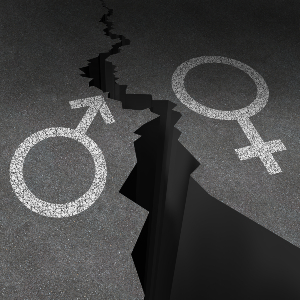
In the last installment of this column, we looked at the myriad of identities that are often under-accounted for or missed entirely in research and data collection. It has become increasingly apparent that data collection not only favors men, but also favors those who are white, able-bodied, and middle and upper class, among other privileged identities.
As previously discussed, some of this divide is due to mistrust (medical and otherwise) by groups of people who have historically been harmed in the name of “research.” However, there is solid and progressive work being done to create trust and accessibility in the research and data communities.
A number of professional development groups have gained notoriety for providing community and unifying underrepresented populations in research and technology. For example, the group, WIR (Women in Research), which has a subgroup representing women researchers of color, recently celebrated their 15th anniversary of “[…] advanc[ing] the contributions and voice of women in research, both for themselves and for the greater good of the industry.”
Another group, GTA Black Women in Tech, offers free membership and enables “[…] black female talents to excel and companies to have access to black women of talent.” By offering anti-oppression resources, guidance from seasoned professionals, and events where women of color in research and technology can connect, this group and others like it encourage representation and professional development for women of color in the tech field.
One issue that came harshly into light in 2021 was vaccine hesitancy among African Americans. As mentioned in the last edition of this column, there is a great deal of historical precedent for this hesitation. Perhaps most notably was the Tuskegee Syphilis Study wherein roughly 400 African Americans were intentionally infected with syphilis without their consent. Treatment was withheld from the participants. Once we are aware of these cruelties, we can see the roots and justification of medical mistrust in the present day. As the American Black community has been hit hardest by the COVID-19 pandemic, a variety of studies and campaigns were put into place upon creation of the COVID-19 vaccine to encourage hesitant people in that population to become inoculated.
According to Harvard medical student LaShyra Nolen, “Where a lot of organizations can go wrong is they jump straight into ‘Here’s why you should get the vaccine’ without recognizing the trauma of the past and the present, and the fears of trauma in the future that a lot of communities have.” Nolen founded a group called the We Got Us Empowerment Project, which seeks to build community trust around vaccines and medical resources with a focus on cultural sensitivity. The group is composed of Black community members and healthcare professionals who share information and debunk contemporary medical myths to encourage the Black community to use all resources at their disposal to make the best decisions for their own health.
Initiatives such as Nolen’s are crucial for research equity in an inequitable world. The We Got Us Empowerment Project is one piece of a larger movement toward fair and equal data collection and distribution. The We All Count project for equity in data science has generated something called the Data Equity Framework, which breaks down data collection and analysis into seven parts with thorough guidelines and tools to guide decision making in the least biased way possible. According to the parent group, “Research and data science are centered around the fallacy that ‘data is objective.’ This is math. These are facts. Numbers don’t lie. Right? […] but as soon as people get involved, they start making choices that – if unexamined – reinforce their own perspective in a way that affects the data outcomes and by extension the decisions or actions based on them.”
This sentiment is backed up by the UN Human Rights advocates, who have put together a guide, A Human Rights-Based Approach to Data. This inspired New York City’s Data Assembly, which “solicit(s) diverse, actionable public input on data re-use for crisis response.” Although these initiatives have not solved the issues of equity within data collection and analysis, they have carved out a path for a fairer future.
In the next installment of this column, we will take a close look at Catherine D’Ignazio and Lauren F. Klein’s book, Data Feminism, as well as other formative and progressive texts on the topic.
